Adaptation. Blu-ray Movie
HomeAdaptation. Blu-ray Movie 
Image Entertainment | 2002 | 115 min | Rated R | Jan 31, 2012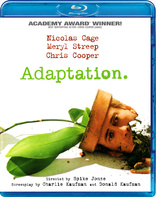
Movie rating
8 | / 10 |
Blu-ray rating
| Users | 4.0 | |
| Reviewer | 4.0 | |
| Overall | 4.0 |
Overview
Adaptation. (2002)
Screenwriter Charlie Kaufman is hired to adapt "The Orchid Thief," a nonfiction book by Susan Orlean about an eccentric orchid breeder, John Laroche, but he becomes completely blocked. Meanwhile, Charlie's happy-go-lucky twin brother, Donald, dashes off a potboiler thriller based on multiple personality disorder. As Charlie continues to struggle, we see Laroche and Orlean in flashbacks, but past and present converge, as Charlie "writes himself" into his screenplay, and he and Donald begin to collaborate.
Starring: Nicolas Cage, Meryl Streep, Chris Cooper, Tilda Swinton, Cara SeymourDirector: Spike Jonze
| Drama | Uncertain |
| Dark humor | Uncertain |
| Surreal | Uncertain |
| Comedy | Uncertain |
Specifications
Video
Video codec: MPEG-4 AVC
Video resolution: 1080p
Aspect ratio: 1.85:1
Original aspect ratio: 1.85:1
Audio
English: DTS-HD Master Audio 5.1 (48kHz, 16-bit)
Subtitles
English SDH, Spanish
Discs
25GB Blu-ray Disc
Single disc (1 BD)
Playback
Region A (locked)
Review
Rating summary
| Movie | 4.5 | |
| Video | 4.5 | |
| Audio | 4.5 | |
| Extras | 0.5 | |
| Overall | 4.0 |
Adaptation. Blu-ray Movie Review
This Mind IS Dangerous
Reviewed by Michael Reuben January 25, 2012Through all the discussion of how Terence Malick included dinosaurs and the birth of the cosmos in The Tree of Life, I kept waiting for someone to remember that Charlie Kaufman had already made the parody. At one point in Adaptation, the hopelessly blocked screenwriter-protagonist—who happens to be named "Charlie Kaufman"—decides he has to get back to basics by opening his film adaptation of The Orchid Thief just before life begins on earth. Then he proceeds through the first single-celled stirrings, creatures emerging from the ocean, dinosaurs, the evolution of mammals, the dawn of civilization and its various stages, and finally to Susan Orlean, the book's author, and John Laroche, the book's subject. Only thus, the fictional Charlie imagines, can he make a movie about flowers without "gimmicks". Oh the irony. At one level, Adaptation is just a sustained "gimmick" to get the real Charlie Kaufman out of the hole he dug for himself when he accepted the job of adapting Orlean's book, then couldn't figure out how to do it. But can the notion of "irony" truly apply to a work as self-aware and self-referential as Adaptation? To a film that, in focusing on its writer's battles with narrative form, asks intriguing, often hilarious and ultimately unanswerable questions about what exactly constitutes a "story"? These questions are not trivial. Like the film's version of "Charlie Kaufman", we all go through life with a running narration in our heads, and we couldn't function if we didn't know how to integrate experience into coherent patterns that can be recorded, recalled and related to others. Storytelling in all its forms, from gossip to epic filmmaking, is essential to human existence. By constructing a "story" about his inability to tell a story, Kaufman was taking on a huge and crucial subject (with the full support of director Spike Jonze, who, as in Being John Malkovich, seemed to be tuned to exactly the same obscure frequency as his screenwriter). But Kaufman also created a fun-house hall of mirrors with no exit, which is part of the joke. Woe to anyone who tries to "solve" Adaptation, the way people have tried to solve famous "puzzle" movies like Mulholland Drive and Memento. The minute you think you have the answer to Adaptation, you suffer the fate of someone ascending the "Penrose steps" in Inception (another famous puzzle movie). It may look like you're still climbing straight up, but suddenly you go tumbling over an invisible precipice and fall flat on your face.
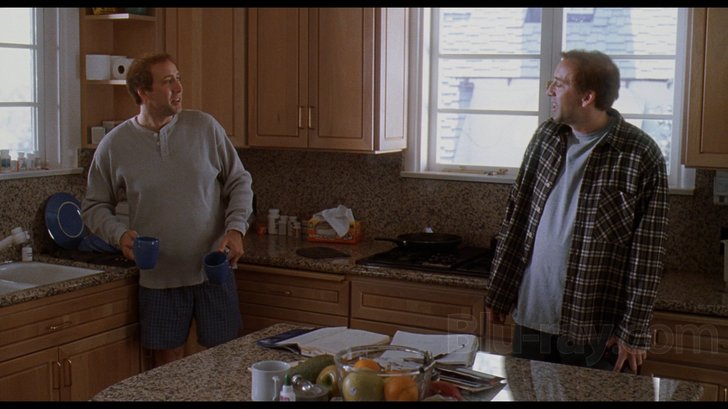
Donald and Charlie Kaufman
I don't want to cram in sex or guns or car chases, you know... or characters, you know, learning profound life lessons or growing or coming to like each other or overcoming obstacles to succeed in the end, you know. I mean... The book isn't like that, and life isn't like that. You know, it just isn't. And... I feel very strongly about this.So says the fictional Charlie Kaufman (Nicolas Cage) to Valerie Thomas (Tilda Swinton), the film development executive who's hiring him to adapt The Orchid Thief for the screen. Charlie is in the midst of filming Being John Malkovich (various cast and crew from that film make cameo appearances), and he's lining up his next project. Valerie has a typical Hollywood mindset. She’s optioned a meditative book by a New Yorker staff writer who met and interviewed an eccentric Floridian orchid expert. But almost immediately, Thomas is considering the most banal possibilities for commercializing a property she supposedly adores. Perhaps, she suggests, the writer and the orchid expert could fall in love, thereby prompting Charlie's diatribe. But you can be pretty certain in Adaptation that, when anyone lays down a rule or establishes a principle (I include both concepts, because, according to one of the film's characters, there's a difference), it will shortly be violated. Thus, however "strongly" Charlie may be against it, by the end of Adaptation, there's been sex (though not for Charlie), a gun, a car chase, profound life lessons, characters who have come to like each other and huge obstacles that have been overcome. The film opens with Charlie's voiceover as he's standing around on the set of Malkovich, and he hates everything about himself—he's bald, fat and ugly, he's sweating, and he hasn't an original thought in his head—but it ends with him telling himself: "I like this. This is good." Of course, the ending may be a fantasy, and the "this" in Charlie's statement might refer to a story idea, life itself or a fleeting moment that will quickly pass. Who knows? How can you be certain of anything in a film where Charlie says that multiple personality disorder is the most overused device in film, but he has a twin brother named Donald (also played by Cage) who also happens to be writing a screenplay—and the screenplay is all about someone with multiple personalities. It seems appropriate, since Donald and Charlie may be the same person. (I still can't decide.) As busy as Adaptation becomes, it still manages to get the essential story of The Orchid Thief into the film. "Laroche is a fun character", Valerie Thomas observes to both Kaufman and Susan Orlean (Meryl Streep) at separate meetings. Indeed he is, and as embodied by Chris Cooper in an Oscar-winning performance (richly deserved), Laroche leaps off the screen with all his cranky, assertive individualism. As the film cuts back and forth between Kaufman's pitiful efforts to write the screenplay and Orlean’s visits to Florida to interview Laroche three years earlier, Cooper has ample opportunity to fill in the elements of the character who attracted people to Orlean's book in the first place: Laroche's quirky (and tragic) personal history, his serial collecting obsessions, his self-taught knowledge of legal precedents to circumvent restrictions on removing endangered species from their natural habitat, his almost bi-polar swings between grandiose self-congratulation and crotchety withdrawal. Orlean was fascinated by this gap-toothed wild man because of his single-minded devotion to orchids, and Cooper shows you why. Passion of such intensity is compelling, even when it's crazy (and infuriating). But did any of this really happen? As the action shifts between Orlean and Laroche in the past (allegedly) and the Kaufman "twins" bickering about their screenplays in the present (allegedly), one is constantly reminded that, whatever problems Charlie Kaufman might be having with writer's block at the moment, he did eventually write the movie, because you're watching it. Did he make up these versions of Laroche and Orlean, just as he made up Donald, who doesn't exist outside the movie, even though he shares screenwriting credit on Adaptation, was nominated for a Golden Globe and an Oscar, and has his own page at IMDb? This question grows all the more tangled as Donald begins to "help" Charlie with his script, and the rival brothers enter into a collaboration of sorts. (Just like the twin brothers who wrote Casablanca. Or not.) It turns out that Donald may have a knack for writing in the Hollywood style (which isn't necessarily a compliment). His serial killer/multiple personality script, The 3, sells immediately when Charlie shows it to his agent, Marty (Ron Livingston, a portrait in crassness). By this point, Charlie is desperate enough to take Donald's advice and sign up for the famous screenwriting course offered by Robert McKee, another real person played by an actor (Brian Cox, who was suggested by McKee himself). McKee's "principles" of screenwriting are anathema to everything Charlie has been trying (and failing) to accomplish. Indeed, as Charlie sits in McKee's audience telling himself in voiceover what a failure he is for attending a course he'd previously dismissed as the last resort of a loser, McKee's voice punches through his thoughts with the words "God help you if you use voiceover . . . any idiot can write a voiceover narration to explain the thoughts of a character". When Charlie stands up to ask a question, McKee rakes him over the coals, but afterward in a private moment, he tells Charlie a secret: The movie will be a hit, as long as the last act is good. But it must come from the characters. "Find an ending, but don't cheat, and don't you dare bring in a deus ex machina. Your characters must change, and the change must come from them." This being Adaptation, it's guaranteed that McKee's advice will not only be rejected, but gleefully so. The ending cheats big time, so much so that, when I first saw the film, I thought it had fallen apart completely. On subsequent viewing, though, it strikes me that the ending is just the last turn that keeps Kaufman's Möbius strip of a narrative flowing in an endless loop. Did Kaufman ever really meet Orlean? Did the events of the last half hour in New York and Florida ever happen (not in life, obviously, but in the world of the film)? Was it all just something Donald dreamed up for one of his nutty screenplays? Is Donald real (at least within the world of the film)? Is Amelia (Cara Seymour), the girl for whom Charlie pines, really there? (A case could be made either way.) Does the make-up girl from the set, Caroline (Maggie Gyllenhaal), really date Donald, or is she just another in the long series of women about whom Charlie fantasizes in vivid detail? (They include a waitress played by Judy Greer, Tilda Swinton's vapid development executive and, oh yes, Susan Orlean.) Does Catherine Keener really visit Charlie's house? OK, my brain hurts. Let's get back to the dinosaurs.
Adaptation. Blu-ray Movie, Video Quality 
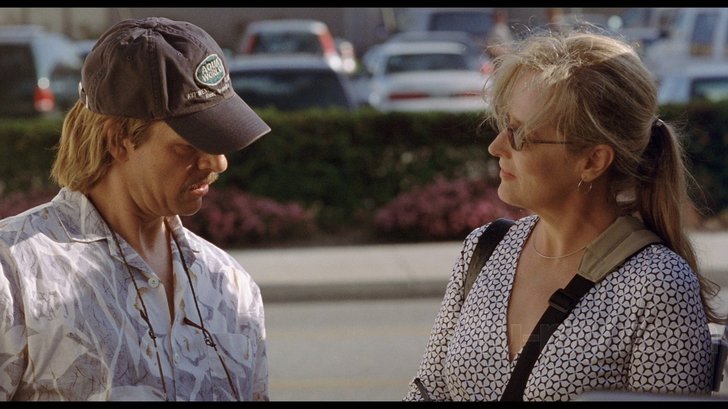
Director Spike Jonze worked with his usual cinematographer, Lance Acord, who also appears in Adaptation as himself, purportedly on the set of Being John Malkovich. Considering the digital trickery necessary to make Nicolas Cage appear as twins Charlie and Donald Kaufman, plus the elaborate cross-cutting between the screenwriting and orchid hunting storylines and the increasingly off-kilter spin of the narrative, both the production design and the cinematography make everything look remarkably ordinary. But I suspect that was the point. In any case, Image/Sony's 1080p, AVC-encoded Blu-ray is another fine catalogue release, expertly reproducing both fine detail and natural grain patterns for a pleasingly film-like image. Digital intermediates were not yet standard practice in 2002, and Adaptation was finished by photochemical means. However, the film stocks were fast and high quality, and the image is sharp, clear and clean. Blacks are appropriately black; the color scheme accurately reflects the intended design, reproducing the drabness of Kaufman's home and wardrobe as well as the much brighter colors that prevail almost everywhere else (vivid greens in Florida; deep blue on the shirt worn by Charlie's agent; even the colors in Charlie's dreams); and you can make out the tiniest beads of sweat on Charlie's brow or the delicate veining in Laroche's orchids. As usual with Image/Sony discs, there is no indication of high frequency filtering, artificial sharpening or compression artifacts.
Adaptation. Blu-ray Movie, Audio Quality 
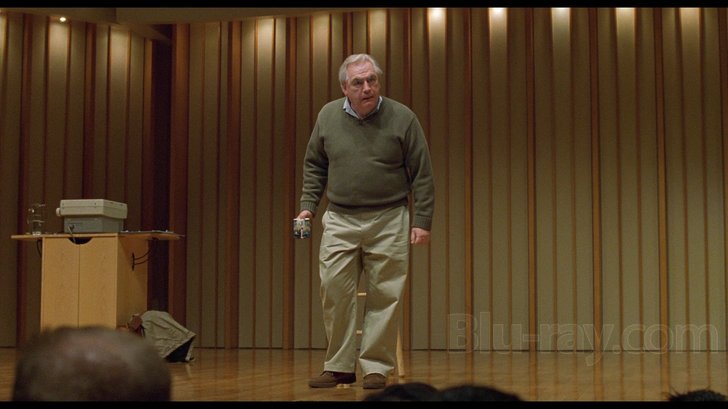
The DTS-HD MA 5.1 track isn't showy, but it's extremely effective at creating key environments, especially the swamps where Laroche hunts his orchids. During those scenes, the viewer feels surrounded by nature (and not always comfortably so). By comparison, the film's other environments are somewhat less assertive, but the sound mix has been carefully engineered to give them a distinct identity, whether it's the restaurant where Charlie gets the writing assignment, a party he reluctantly attends, McKee's writing seminar or the bar where Charlie has a drink with McKee afterwards. There are several scenes requiring distinct, intrusive sound effects (and I don't want to be more specific, for the sake of first-time viewers), and these register with the requisite impact. Both the dialogue and the voiceovers are clearly rendered. The playful score by Carter Burwell (the Coen Brothers' usual composer) has been skillfully blended into the mix to register almost subliminally, so that you're hardly aware the film has music. It does, though, and it's very effective.
Adaptation. Blu-ray Movie, Special Features and Extras 

Sony's 2002 DVD release of Adaptation was a so-called "Superbit" disc, which means it lacked extras, although it apparently included the film's trailer. (I don't have the disc to confirm this.) The trailer was clever and made effective use of the Queen/David Bowie song "Pressure". Unfortunately, it has not been included on the Blu-ray.
- Behind the Scenes in the Swamp (SD; 1.33:1; 2:03): A short behind-the-scenes clip featuring Cooper, Streep, Cage, Jonze and Acord on location. Due to the nature of the scenes being filmed, it's probably better to view this extra after seeing the film. Then again, due to the nature of the film, it may not matter.
Adaptation. Blu-ray Movie, Overall Score and Recommendation 
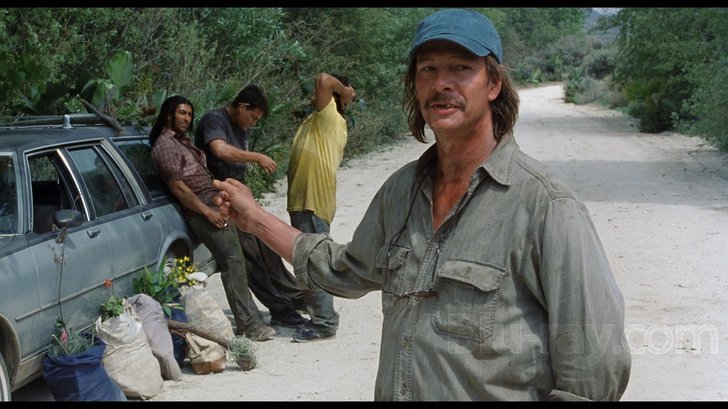
In 2008's Synecdoche, New York, Kaufman returned to many of Adaptation's themes, but this time in a darker vein. Where Kaufman's namesake in Adaptation struggled with writer's block, the playwright Caden Cotard in Synecdoche has the opposite problem: an inability to stop writing. Both conditions spring from the same source, namely, an artist's grand but ultimately impossible desire to infuse his work with the weight, the density and the truth of actual existence. Of course, that aspiration is impossible, because reality is too big; hence the rhetorical notion of a "synecdoche", in which one part of a whole is used to represent the whole. Try to include the whole, and you end up either like the Charlie Kaufman character in Adaptation, feverishly rummaging around the known history of the world, unable to decide where to start, or like Synecdoche's Caden, who never finishes because there's always more to add. Synecdoche spins out this notion of artistic impossibility as a melancholy fantasy with a downbeat ending that, as Robert McKee might have forewarned, doesn't send anyone home with a smile. But Adaptation remains a playful farce that never takes anything seriously, including itself. As long you don't mind the incessant head games, it's an entertaining ride. The Blu-ray is a faithful reproduction, and both the film and the disc are highly recommended.
Similar titles
Similar titles you might also like

Synecdoche, New York
2008

Carnage
2011

Barton Fink
1991

The Royal Tenenbaums
2001

Birdman
Birdman or (The Unexpected Virtue of Ignorance)
2014

Happiness 4K
1998

Punch-Drunk Love 4K
2002

The King of Comedy
1982

Monsieur Verdoux
1947

Calvary
2014

After Hours 4K
1985

Being John Malkovich
1999

Stranger Than Paradise
1984

American Beauty
1999

Volver
2006

Life During Wartime
2009

The Unbelievable Truth
1989

Enlightened: The Complete First Season
2011

Brief Interviews with Hideous Men
2009

The Double
2013

